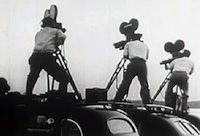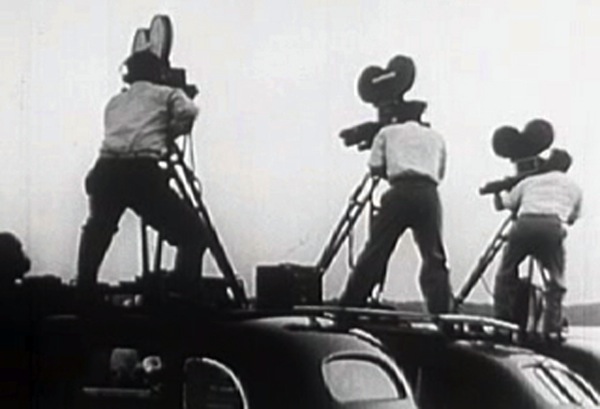No ‘Mad Men’ Need Apply: Vintage Video Portrays Photography Careers in a Dull Light
posted Wednesday, October 3, 2012 at 10:45 AM EDT

Photography didn't look like much of an interesting career nearly 70 years ago, at least according to a 1946 vocational guidance film that was recently rescued out of some dusty archive and posted online. "Your Life Work: Photography" is filled with characters such as the "commercial man" and the "portrait man" who evidently worked on a planet a million miles away from the exciting world of TV's "Mad Men." The only thing the two seemed to have in common is that there are no working women and all the men wear fedoras.
The photographers depicted in "Your Life Work: Photography" are incredibly passive. They don't really seem to do anything; they just lazily look over their cameras and pretend to move lights around. And when the narrator starts to discuss careers in motion picture photography, his voice grows downright solemn. He warns the would-be photographer that despite the advanced skills and expensive equipment needed for this type of work, it was already overcrowded with too many job seekers. Hollywood was full up, and the only real photography jobs left were in "commercial," "portrait" or "press" photography -- careers which the narrator emphasizes are dull, mundane and humdrum.
Watching the 10-minute, black-and-white film brought back memories of my first, negative experience with professional photography -- an encounter with a "commercial man" at a family wedding who almost most steered me away from the career forever. I was about 7 or 8 years old at the time, and for the event had been stuffed into an ill-fitting, itchy, gray polyester suit -- a rental, of course -- that made me look like a shiny Pillsbury Doughboy. At the wedding, just as I had gotten together with some friends, my father grabbed me by sleeve and dragged me over to a side room for the obligatory family photo session. It was there I met Harry B.

Even photojournalism is portrayed as mostly boring by the narrator of "Your Life Work: Photography": "Contrary to popular opinion, a press photographer's life is not just one big thrill after another. He does shoot exciting scenes from time to time, but such events are the exception. Most of his work is routine in nature, consisting mainly of pictures of people and places connected with the news."
In the side room with my father, I found my boisterous and slightly inebriated relatives standing around oddly silent. Opposite them, a rather large brusque man with a camera was shouting orders.
"Madame," he said to one of my aunts, "I just asked you nicely to stand over there. You have not moved, darling. Whatsa matter -- don't you understand English? Go, go!"
"And you sir, would you put down that drink, this is a family picture I am trying to make, not a whiskey ad, OK?"
This was Harry B., our local "commercial man" who operated a small studio on the edge of the neighborhood. Harry photographed everything, weddings, funerals, high school basketball games and sometimes the news for a city paper. A WWII veteran, he had seen combat in Germany and later Japan and oozed a kind of world-weariness that we, his unsophisticated working-class clientele, took as disdain. His Speed Graphic was battered and frayed, a souvenir of better and more exciting times.
Once he had us all lined up, Harry was ready to take the photo when he abruptly lowered the camera, and looked me squarely in the eye and said, "Kid, I am taking a picture for posterity and would appreciate it if you would spit out the gum. And stop dancing. If you have to go to the bathroom, it will just have to wait. Got it slugger?"
I stared at him, afraid to move. Numbly I spit out my gum and looked into the camera. The flash fired and suddenly I couldn't see anymore. It was my first experience with a flash and I started shaking, terrified that my blindness was permanent.
I didn't see the film when it was released, but the work of a "commercial man" in that era certainly soured me on photography.
After Harry B. delivered the proof photos, our whole family came over to our house to look at them. Sitting on my mother's plastic slipcovered sofas and chairs, they passed the photos around. When I got to see them, I was shocked. In every picture I was in, my shiny rental suit had reflected so much flash light that I looked as though I were exploding. My brother and cousins got a big laugh out of this and made my life miserable for weeks. For several years afterwards, I really hated photographers and especially Harry B.
But, then, when I was 12, my father gave me his Kodak Brownie to take on a school trip. When I got my photos back from the drugstore, it took just one look and I knew I had found my life work, photography.
(via ISO1200 via The Atlantic)